SEO
Continuous SEO: Can You “Complete” SEO?
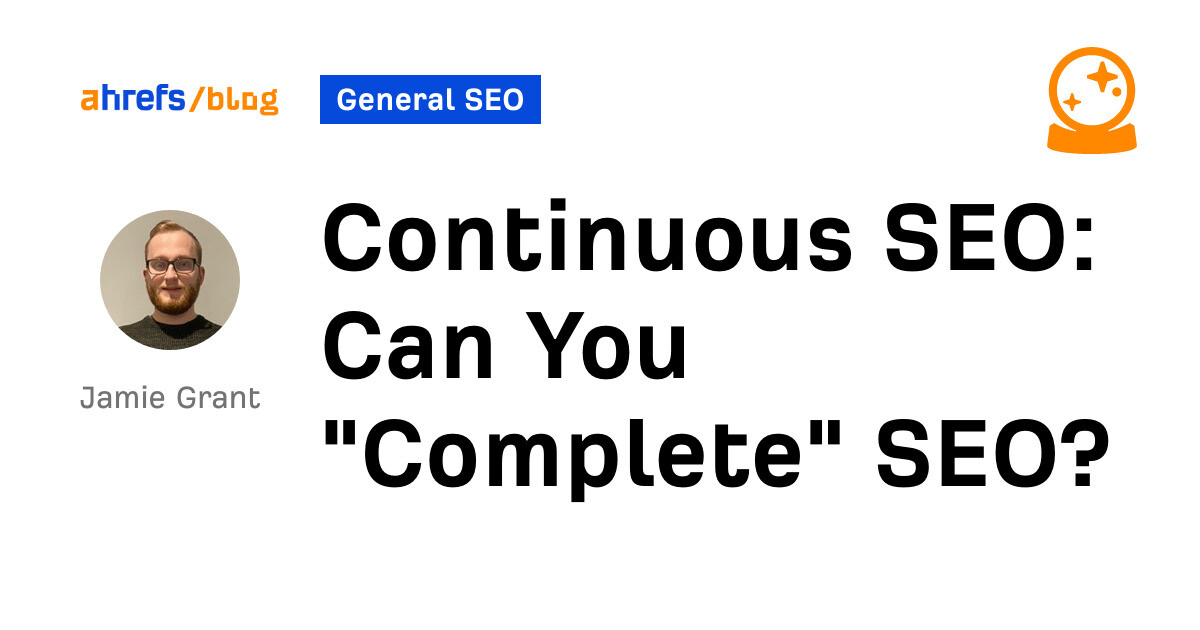
Once you achieve your SEO goals and have a sustainable stream of organic traffic, is it time to refocus budgets to other channels? Can you really “complete” SEO, or should it be continuous?
In this guide, we’ll answer just that and share some top tips for implementing a continuous SEO strategy.
The answer, in short, is almost always no.
SEO, in nature, is a continuous strategy. You can’t just turn it on and off like a tap in the same way you can with PPC, for example.
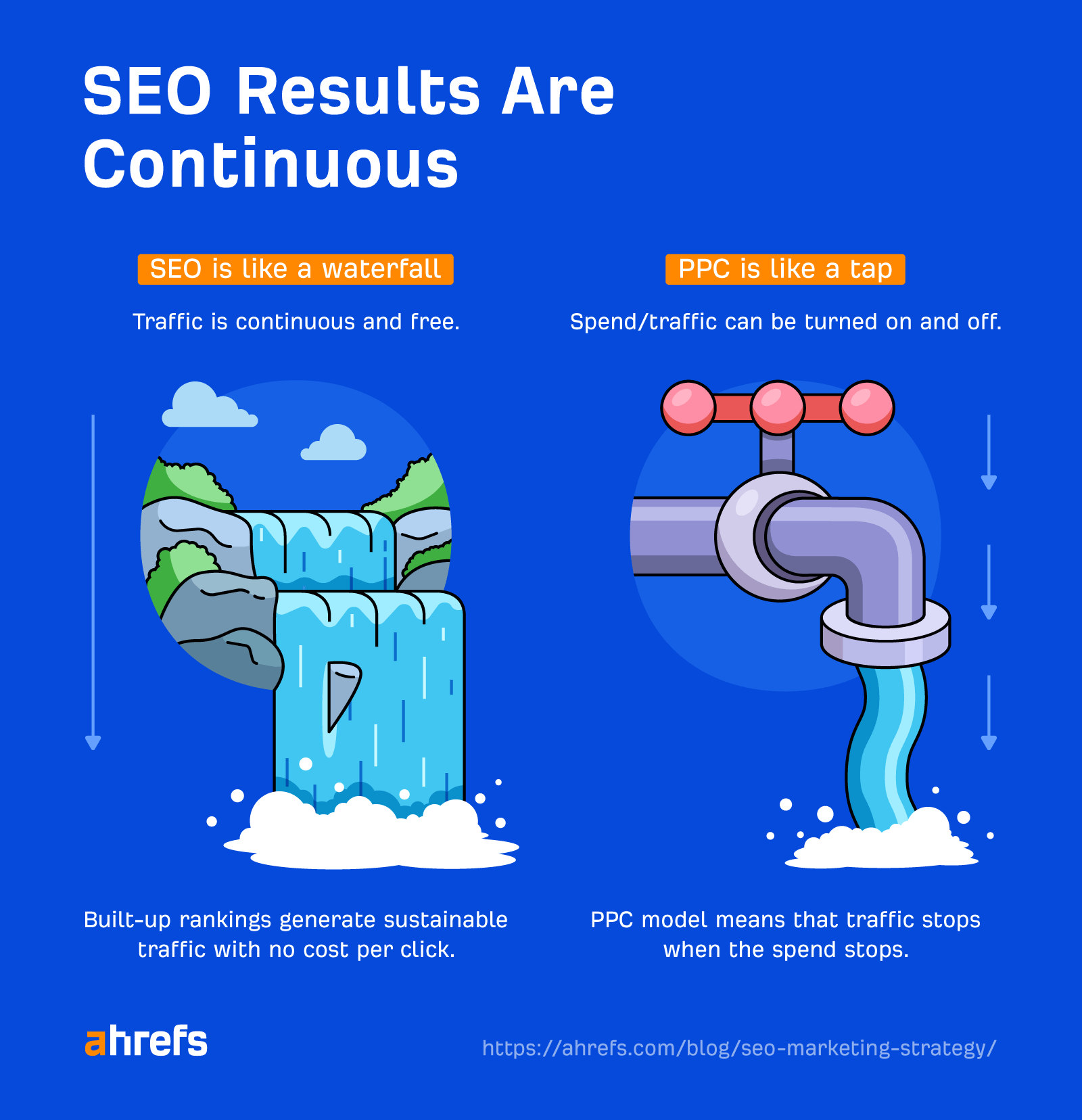
But of course, like all things in SEO, it’s much more nuanced than a simple yes or no.
With that in mind, here are the most common reasons as to why you should continue to invest in SEO as an ongoing strategy.
The algorithm doesn’t stand still
In 2022 alone, there were over 10 algorithm updates confirmed by Google. In reality, there were likely many more updates that weren’t publicly announced by Google too.
These many updates and tweaks to the algorithm provide new ways to impress Google. Most of these updates focus on rewarding quality content within the search rankings.
For example, Google recently updated its quality rater guidelines by adding an extra “E” into E-A-T, making it E-E-A-T. Besides making the acronym a bit more confusing to pronounce, it provides some extra opportunities to showcase quality.
The additional “E” stands for experience, meaning Google is now taking into account whether the page is written by someone with personal experience on the respective topic.
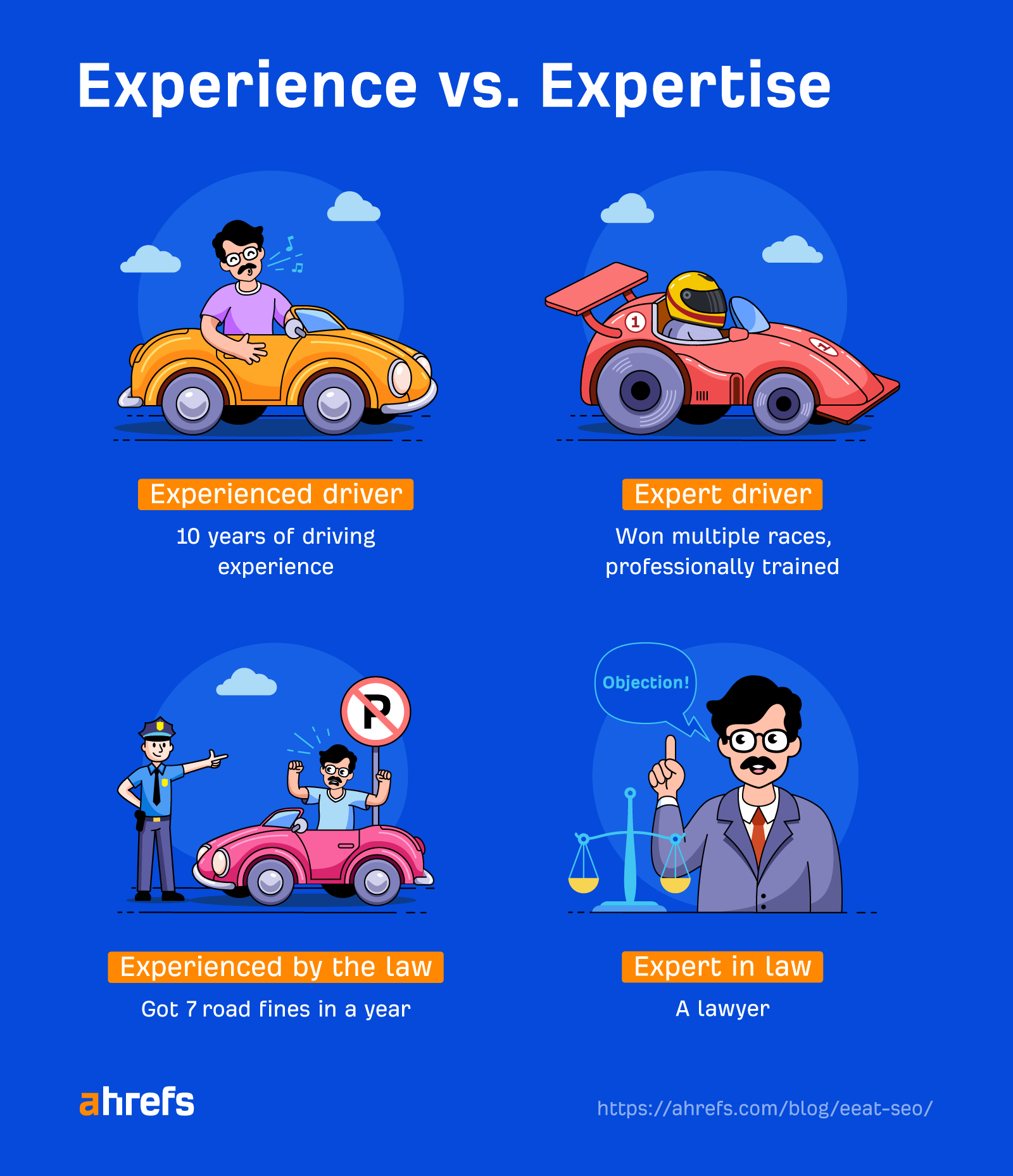
Google hasn’t directly told us that it uses this as a ranking signal. Instead, its quality raters look for examples of this in sites that rank as a means to measure the performance of its own ranking algorithm.
That said, we absolutely know that Google is now taking “experience” more seriously and that its raters are looking for examples of it in content that is ranking well. So with that in mind, it’s a fair assumption that Google is looking to reward sites that showcase E-E-A-T in its rankings.
Another example is Core Web Vitals. In May 2021, Google introduced Core Web Vitals as a ranking signal. Core Web Vitals are a set of technical page experience metrics measured via CrUX (Chrome User Experience Report) using real user data.
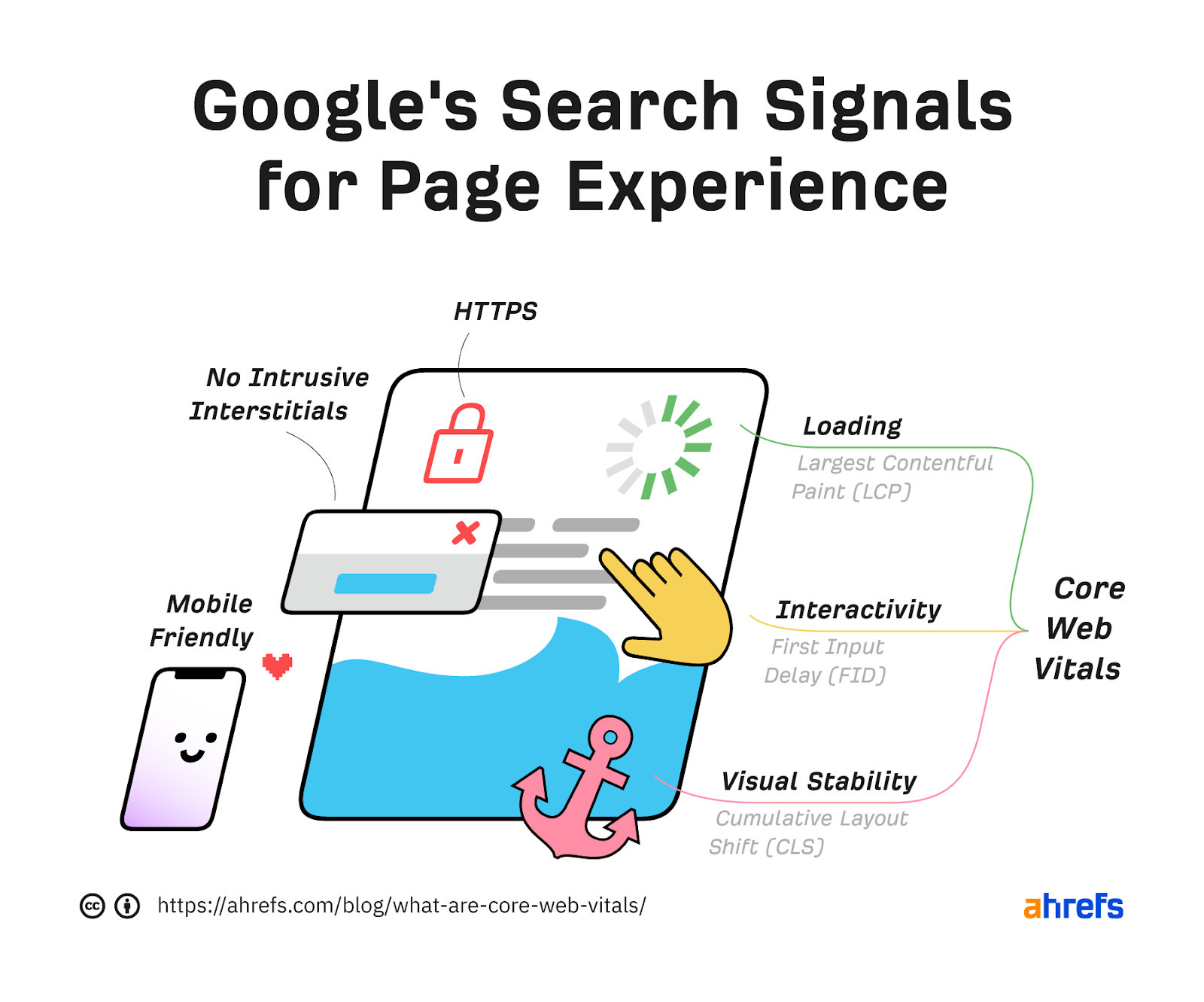
Following this, Google has recently announced that it will update its CrUX ranking signals. From March 2024, Google will no longer be using FID (First Input Delay) as a ranking signal, replacing it with INP (Interaction to Next Paint).
This provides new technical challenges that you’ll need to stay on top of.
While Core Web Vitals are widely regarded as a minor ranking signal, you’ll certainly want to stay on top of these metrics. It could well be the difference between a page #1 and page #2 ranking for some of your most competitive keywords.
With the algorithm being volatile at times and constantly evolving, SEO is not just about getting it right once. A page #1 ranking today could be a page #2 ranking overnight.
There’s always opportunity to improve
Often enough, there’s almost always room to improve and gain more traffic via search terms that are super relevant to your website. After all, it’s pretty much impossible to rank #1 for every keyword you are targeting, even if you are Wikipedia. So there’s always room for growth.
Even at Ahrefs, for example. The team is doing an incredible job at ranking in the top positions for relevant keywords. That said, even within the top traffic-driving keywords, there are always opportunities to improve.
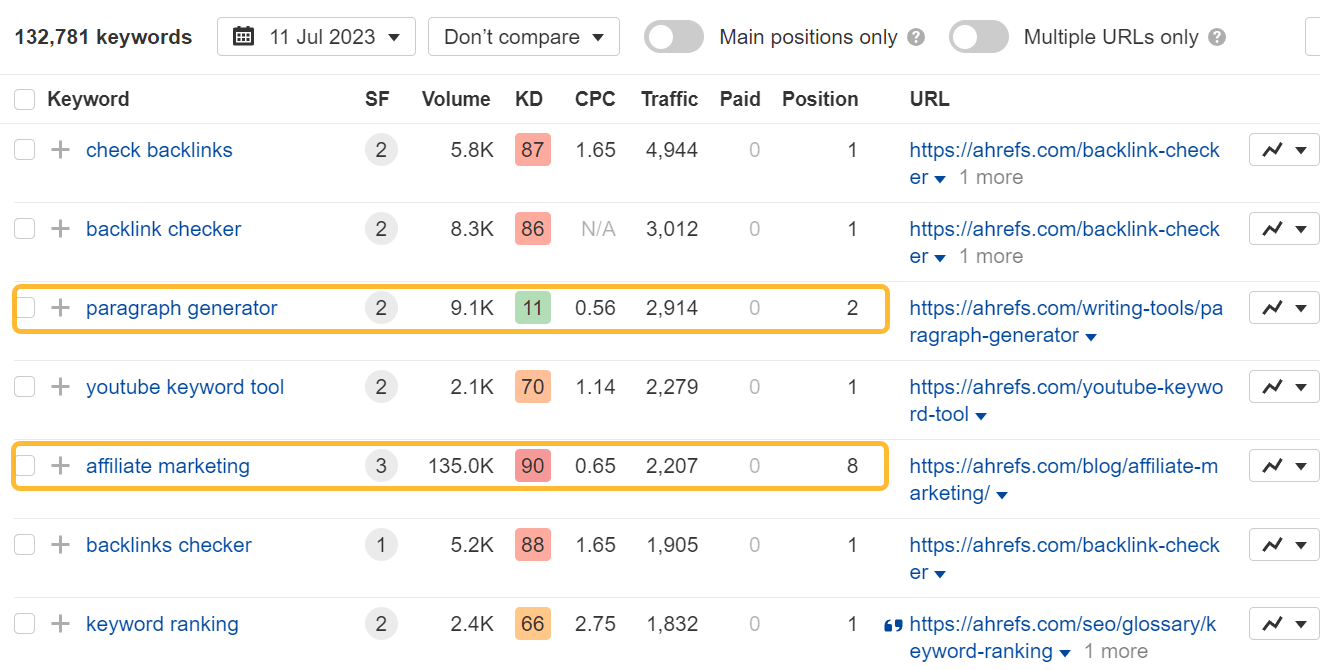
Often, these super important “money” keywords are your most competitive keywords, so keeping your content up to date and optimized is essential to maintaining and further improving on strong rankings.
Beyond ranking in the top positions for your commercial keywords, there’s often so much opportunity to create and scale informational content.
Earlier on, I mentioned the importance of showcasing E-E-A-T. Producing and scaling useful, relevant, and high-quality content is a great way to demonstrate experience, expertise, authority, and trust. You’d also be building up strong associations and topical authority to your niche in the eyes of Google.
While this may seem complex, in principle, it’s simple.
Let’s say you operate in the toy sector. You can show Google that your business is all about toys by providing useful guides to support your existing e-commerce landing pages.
There is a wide range of content opportunities here; this could range from tips for cleaning your kid’s toys to reviewing the best storage solutions. Not only does this build relevant associations and topical authority within your niche in the eyes of Google, but you’ll also be putting your brand in front of potential future customers too.
Another benefit to upper-funnel content is that you can raise brand awareness among potential customers. While they may not be looking to make a direct purchase straight away, you’ll be increasing the chances of them making that purchase with you in the future.
In my previous article on fitting SEO into your marketing strategy, I used a kayak store as an example.
A user searching “how to store a kayak” may consider purchasing a kayak in the future. If they find the guide to be useful and informative, this increases the chances of said user making that purchase through your store.
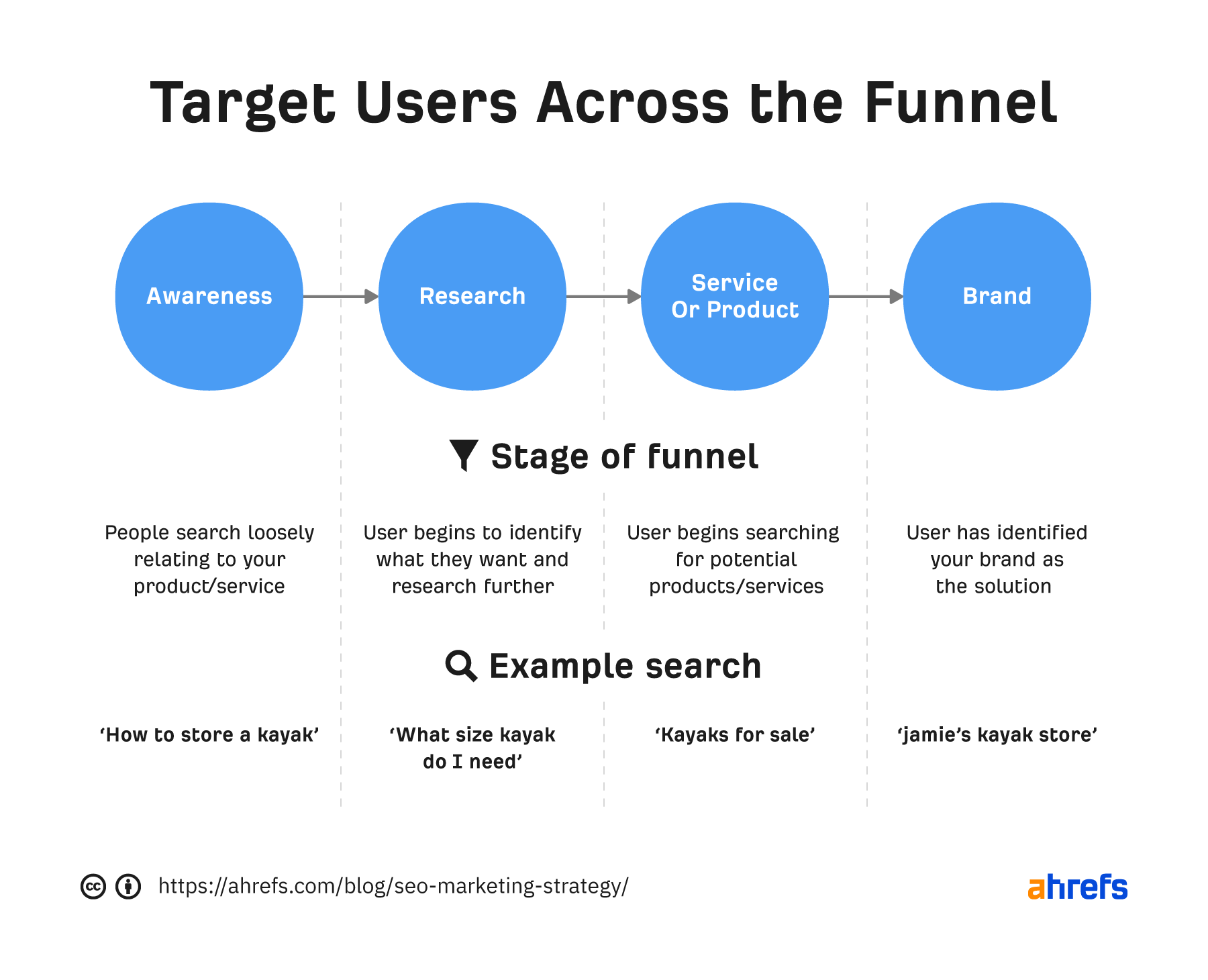
SEO is super competitive
In SEO, it’s easy to forget that it’s not just you going for growth via Google rankings. It’s highly likely that your competitors won’t be standing still.
Complacency is a big danger. While you’ve slowed down, your competitors could be more active by:
- Updating existing content.
- Rolling out fresh content to target rising keywords.
- Building on their existing backlink profiles.
By just standing still, you could soon see your performance “fall backward” in what is a relatively volatile and often competitive channel.
Let’s look at the position history for the keyword “life insurance” via Ahrefs’ Keywords Explorer as an example.
Just over a period of 30 days, we’ve seen the top ranking change hands frequently across three competitors.

Furthermore, we can see how volatile search rankings can be just by following the green line (newyorklife.com). This domain peaked in #1 before temporarily dropping to #7 within a couple of weeks.

It may be time to conquer new markets
Depending on the needs and capabilities of your business, it may be time to optimize for new markets.
Or if you already have an international SEO strategy, perhaps it’s time to double down on those secondary markets that may have been previously neglected.
Given that international SEO is one of the most complex areas of SEO, it’s unsurprising that many websites struggle to rank in the top positions for their targeted keywords globally.
You can quickly see how you and your competitors are performing globally by entering the respective domains into Ahrefs’ Site Explorer.
Notice that your main competitor is receiving a lot more traffic from a certain country than you? This is likely worth a deeper investigation.
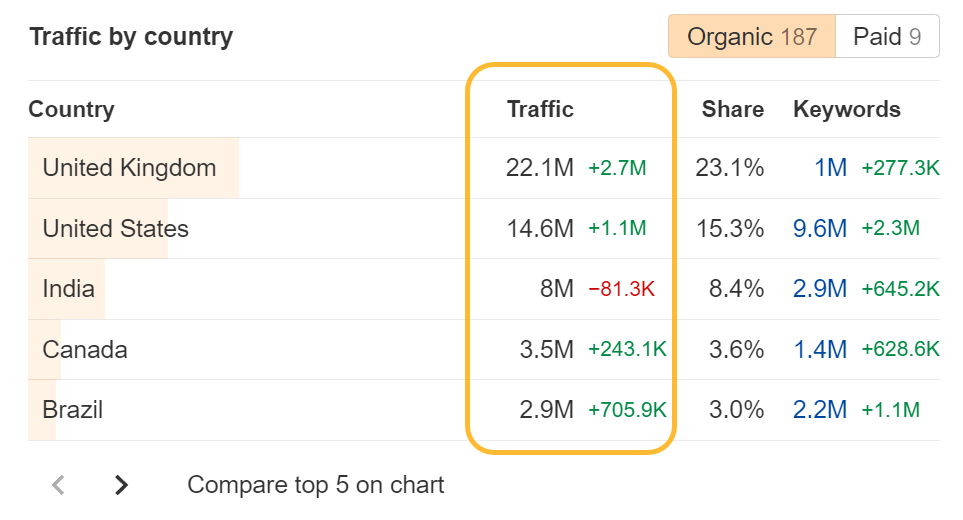
It quite often turns out that your top SEO opportunity countries aren’t the ones that your business is prioritizing. If that is the case, this data is incredibly powerful and could form the business case to reprioritize and focus on new markets with SEO potential.
We’ve established that you can’t just start and stop SEO and that a continuous SEO strategy is the way forward.
A continuous SEO strategy can range from updating your old content to regularly updating your SOPs to form a more efficient and effective SEO process.
Here are my top five tips for rolling out a continuous SEO strategy.
1. Continuously monitor the technical health of your site
Technical SEO is the crucial foundation of any SEO campaign. Given how big an impact one technical hitch could have on your rankings, adopting a proactive approach is essential.
Sure, conducting a technical audit at the start of an SEO campaign is incredibly useful. However, I find the approach of only doing a technical audit once every six to 12 months as insufficient.
In that interim period, one negative technical change may result in you scrambling to work out what caused a loss in rankings.
With Ahrefs’ Site Audit, you can set your crawls to run on an automated schedule—be it a daily, weekly, or monthly audit.
You can also schedule the exact time for the audit to run, meaning you’ll have the results from the audit ready at a time that suits you best.
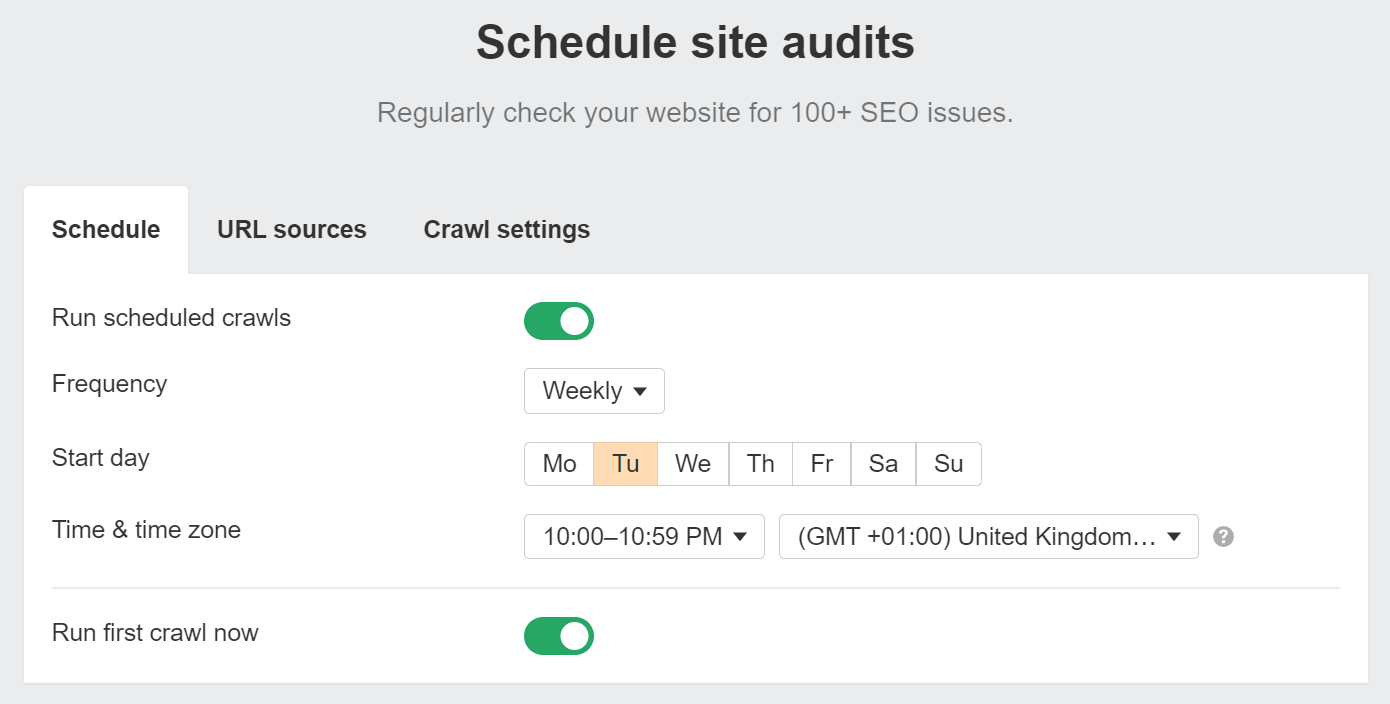
You’ll be able to compare your results against previous crawls too. So if you notice the number of errors is slightly higher than in recent audits, you’ll know a technical issue has crept in.
I personally like to run these audits at least weekly with regular manual checks in between. This supports a proactive approach to SEO. It also means technical issues are captured as and when they happen, as opposed to several months down the line in a technical audit.
2. Automate repetitive tasks
A continuous SEO strategy doesn’t just require you to “do more SEO,” but also to “do SEO” more effectively.
We just touched on how you can automate your technical auditing by scheduling that on Site Audit. This is a great start for making your SEO workflow more efficient, but we don’t have to stop there.
Since ChatGPT was born into the world, I’m sure we’ve all been presented with the “top five ChatGPT prompts to automate your workflow.”
I have no doubt we can all agree that the social media craze for ChatGPT prompts has diluted the conversation somewhat.
To save you from the torture of reading these dreaded Twitter threads, Ahrefs’ Si Quan Ong has reviewed and shared some of the best ChatGPT prompts for SEOs and the ones you should avoid (no matter how many Twitter threads they appear in).
One of my favorite ChatGPT prompts is to generate outlines for content.
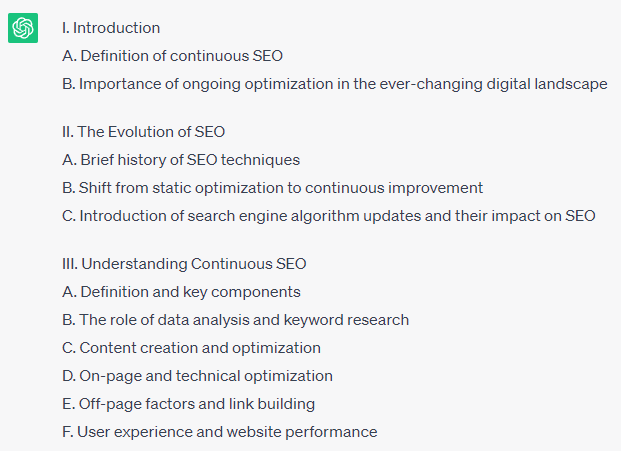
Ultimately, my final outline will always look nothing like the initial ChatGPT response. That said, I find this helps get those important “creative juices” flowing while I’m in that ideation phase. This leads to much more efficient production of content outlines.
Keen to learn more about SEO automation? Check out Fraser McCulloch’s automation tips for these nine common SEO tasks.
3. Review and update existing content
Content can naturally become outdated over time. And users can usually tell when an article feels old.
If you wait too long to update your content, your competitors could have:
- Information that’s more up to date.
- Statistics and analysis from more recent datasets.
- Case studies that are more relevant to today’s questions.

Ultimately, it’s Google’s job to ensure users have a good experience when they click through to content via the search results. So if your competitors are doing a good job at keeping their content up to date and you are not, you’ll likely lose out in the rankings.
Google uses a ranking factor called Query Deserves Freshness (QDF) to determine how fresh a piece of content should be in order to rank for a particular search term.
This ranking signal is pretty much what it says on the tin. If Google determines that users are looking for fresh content in their searches, it will look to prioritize fresh content in the rankings.
Google leans on news sites, blog posts, and search requests to determine when users are looking for fresh content in their searches. In 2007, Amit Singhal (former VP at Google) talked about this in an article for The New York Times:
The QDF solution revolves around determining whether a topic is “hot.” If news sites or blog posts are actively writing about a topic, the model figures that it is one for which users are more likely to want current information.
We shouldn’t interpret QDF as just applying to news items. What could seem like an “evergreen” keyword could soon need fresh content—should there be a strong rise in related news posts and skyrocketing search demand.
To learn more, Ahrefs’ Josh Hardwick has a guide on implementing an SEO content republishing strategy.
4. Continue to look for new content opportunities
As the demands from users change over time, this is reflected in the queries they search for online. In turn, this means that new content opportunities will arise every now and then.
You can stay on top of new content opportunities by:
- Regularly conducting keyword research.
- Regularly checking for keyword/content gaps between you and your competitors.
Ahrefs’ new Competitive Analysis tool is great for seeing what keywords your competitors rank for that you don’t.
Start off by entering your domain as the target and then the domains of your competitors.
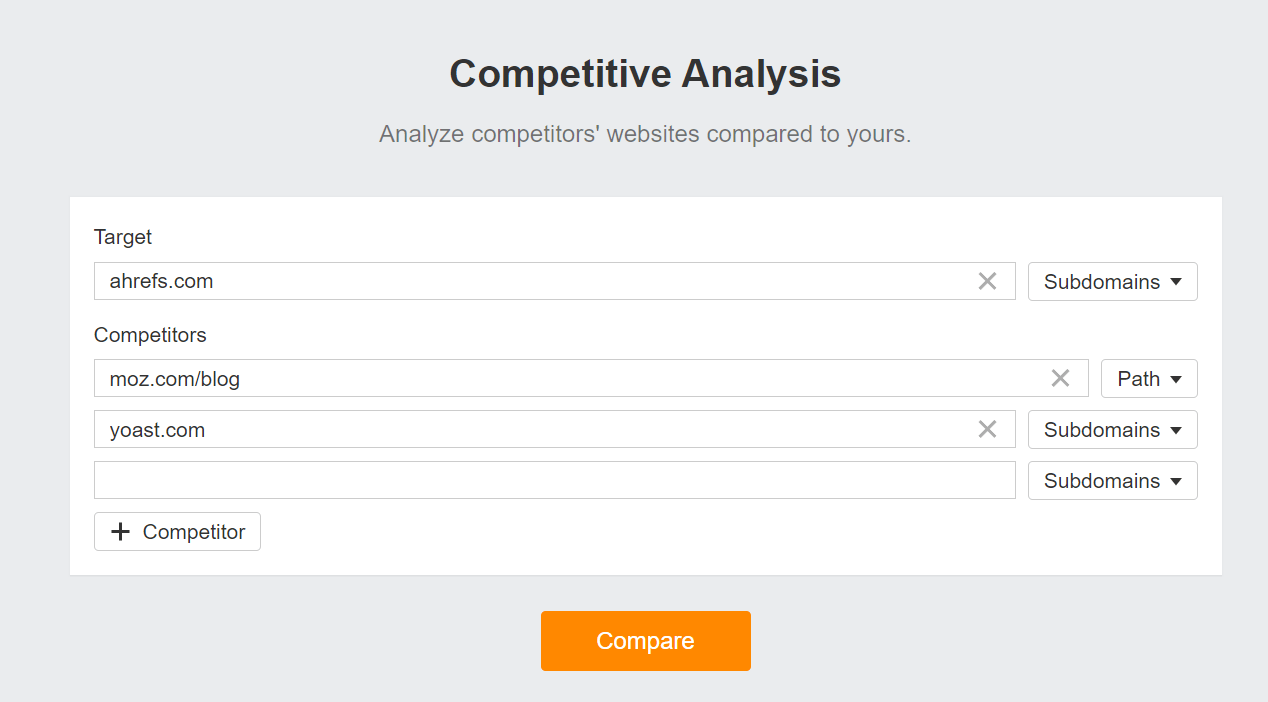
In just a few clicks, you’ll be presented with a list of keywords that your competitors rank for (within the top 10 positions by default) where you don’t rank at all.
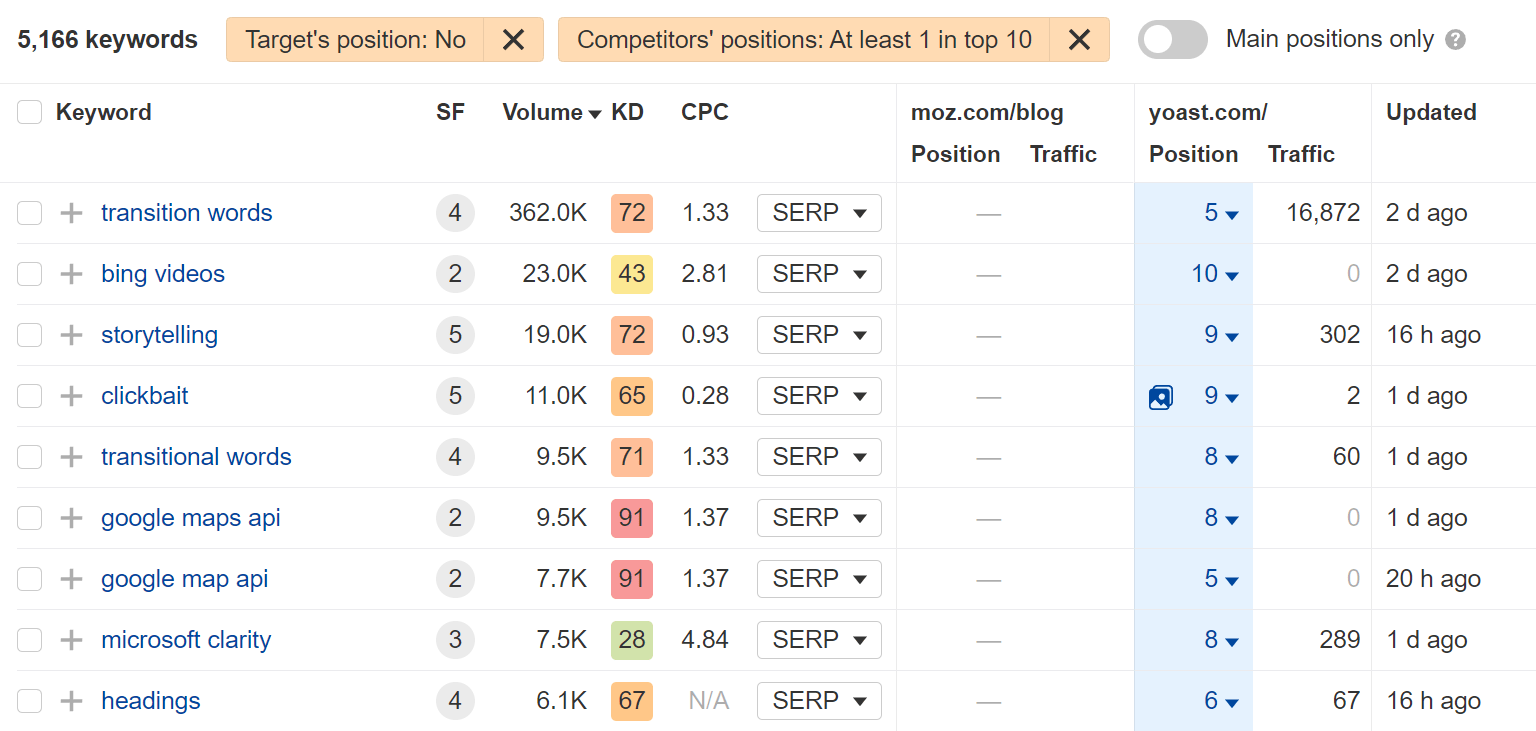
I personally like to go one step further and set the “Target position” filter to “No position or custom” with a minimum ranking of 11.
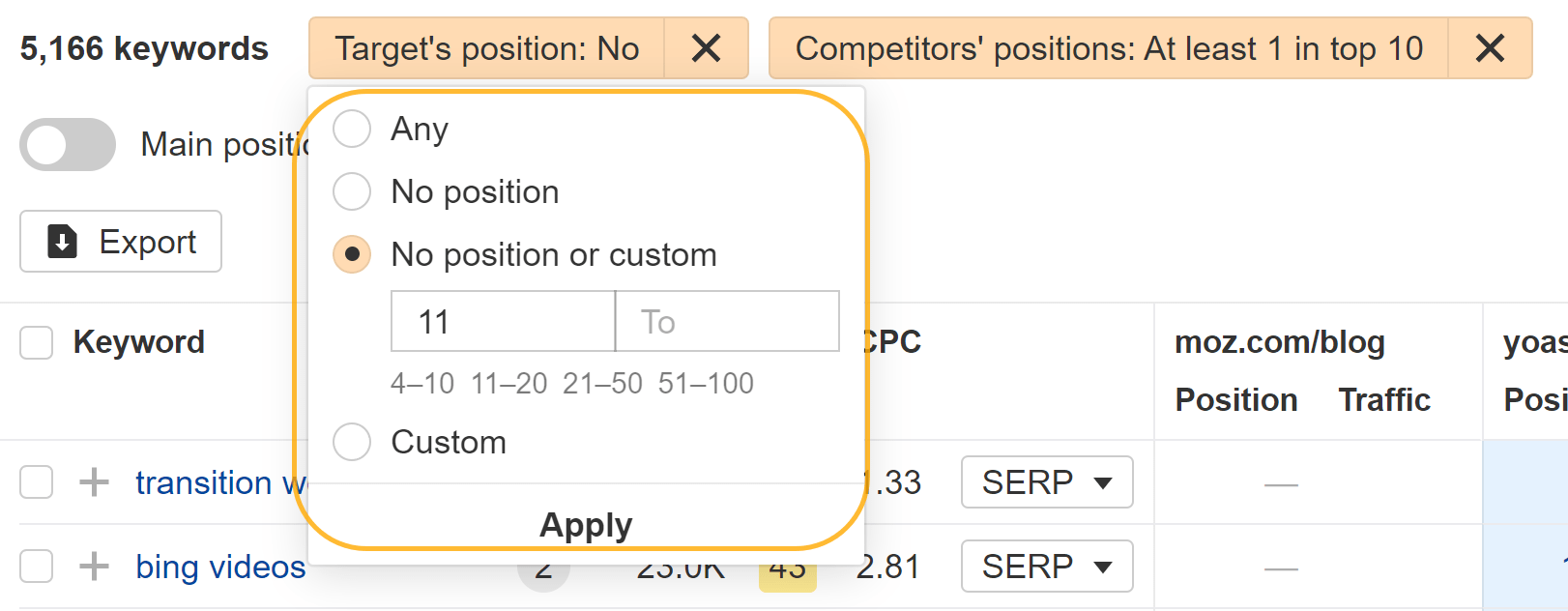
This means we’ll now be presented with a list of keywords that our competitors rank in the top 10 positions where we rank from page #2 or worse.
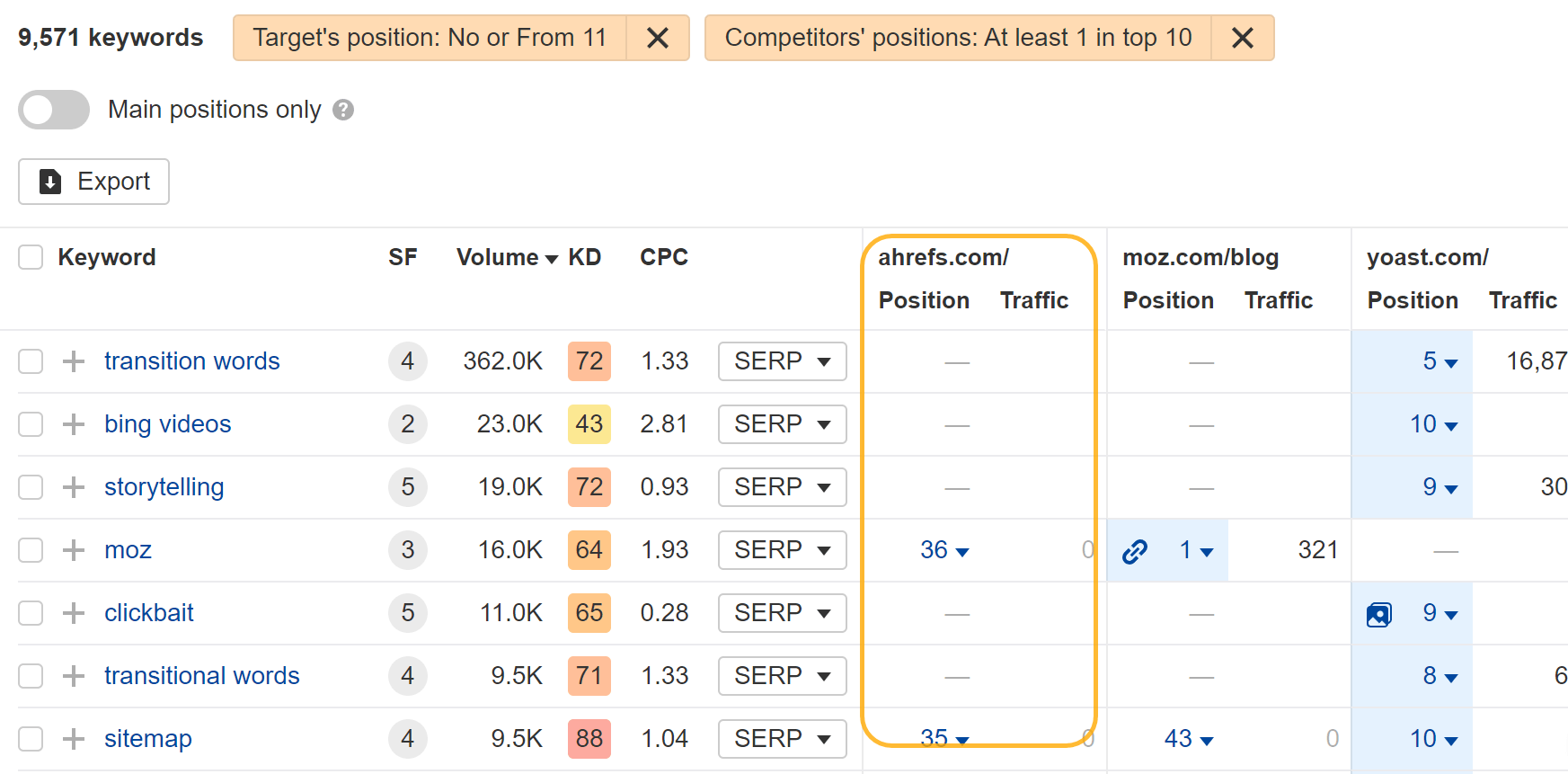
This is super useful for staying on top of what content your competitors are rolling out and what keyword gaps you may need to jump on.
5. Monitor and review your performance frequently
Most SEOs would agree that effective monitoring and reporting are essential. That said, I believe it’s an area that can be done more effectively by many.
One example is that many SEOs rely solely on Search Console to see how they are ranking for their top keywords.
There’s no doubt Search Console is an incredibly useful source for reporting and should be included in reports. That said, I don’t see it as the most effective tool to measure ranking performance. Here’s why:
- Average ranking data is often heavily skewed by irrelevant searches (e.g., irrelevant locations).
- Data lag means you can’t see how you are ranking for a keyword today.
- You can’t compare the share of voice and rankings against competitors.
A rank tracking tool like Ahrefs’ Rank Tracker is essential for daily ranking updates for your domain and your competitors. You’ll also benefit from useful metrics like share of voice and estimated traffic.
To get started with Rank Tracker, simply set your location, enter your keywords from your own keyword lists, and hit “continue.” Don’t forget to include your competitors on the next step too.
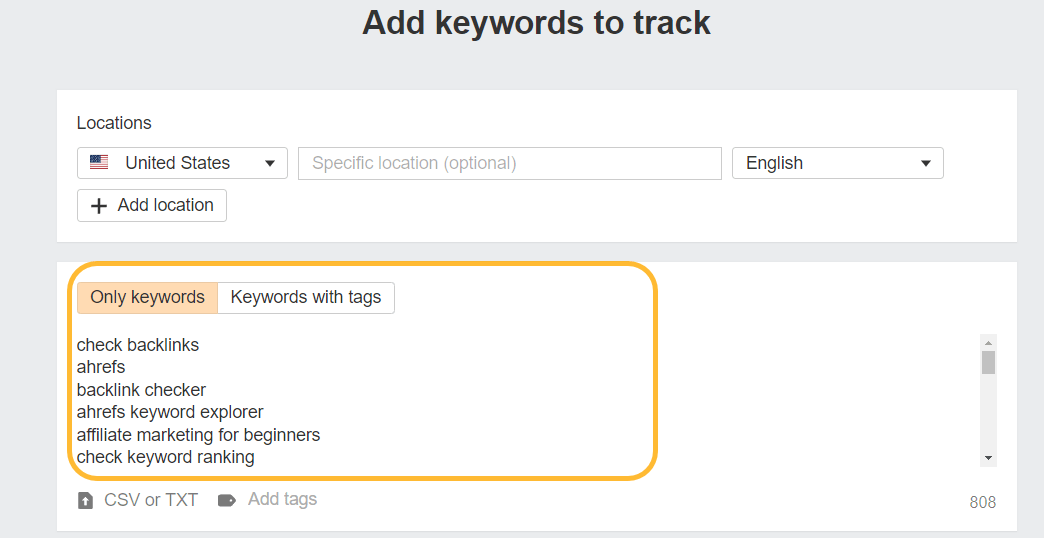
In no time, you’ll start to see ranking data pull through for your keyword list, such as the respective ranking positions and ranking URLs.

Don’t forget to connect Ahrefs up to your custom SEO dashboards, whether that’s Looker Studio or through API calls.
Final thoughts
SEO, as an ongoing and continuous strategy, should be non-negotiable.
As tempting as it may be to refocus budgets to other channels or rest on your laurels, complacency is a huge risk to organic performance.
Implement a continuous SEO strategy by:
- Regularly monitoring the technical health of your site.
- Automating repetitive tasks.
- Reviewing and updating existing content.
- Looking for new content opportunities.
- Reviewing your performance frequently.
Have any questions? Ping me on Twitter and let me know.
SEO
Google On Hyphens In Domain Names

Google’s John Mueller answered a question on Reddit about why people don’t use hyphens with domains and if there was something to be concerned about that they were missing.
Domain Names With Hyphens For SEO
I’ve been working online for 25 years and I remember when using hyphens in domains was something that affiliates did for SEO when Google was still influenced by keywords in the domain, URL, and basically keywords anywhere on the webpage. It wasn’t something that everyone did, it was mainly something that was popular with some affiliate marketers.
Another reason for choosing domain names with keywords in them was that site visitors tended to convert at a higher rate because the keywords essentially prequalified the site visitor. I know from experience how useful two-keyword domains (and one word domain names) are for conversions, as long as they didn’t have hyphens in them.
A consideration that caused hyphenated domain names to fall out of favor is that they have an untrustworthy appearance and that can work against conversion rates because trustworthiness is an important factor for conversions.
Lastly, hyphenated domain names look tacky. Why go with tacky when a brandable domain is easier for building trust and conversions?
Domain Name Question Asked On Reddit
This is the question asked on Reddit:
“Why don’t people use a lot of domains with hyphens? Is there something concerning about it? I understand when you tell it out loud people make miss hyphen in search.”
And this is Mueller’s response:
“It used to be that domain names with a lot of hyphens were considered (by users? or by SEOs assuming users would? it’s been a while) to be less serious – since they could imply that you weren’t able to get the domain name with fewer hyphens. Nowadays there are a lot of top-level-domains so it’s less of a thing.
My main recommendation is to pick something for the long run (assuming that’s what you’re aiming for), and not to be overly keyword focused (because life is too short to box yourself into a corner – make good things, course-correct over time, don’t let a domain-name limit what you do online). The web is full of awkward, keyword-focused short-lived low-effort takes made for SEO — make something truly awesome that people will ask for by name. If that takes a hyphen in the name – go for it.”
Pick A Domain Name That Can Grow
Mueller is right about picking a domain name that won’t lock your site into one topic. When a site grows in popularity the natural growth path is to expand the range of topics the site coves. But that’s hard to do when the domain is locked into one rigid keyword phrase. That’s one of the downsides of picking a “Best + keyword + reviews” domain, too. Those domains can’t grow bigger and look tacky, too.
That’s why I’ve always recommended brandable domains that are memorable and encourage trust in some way.
Read the post on Reddit:
Read Mueller’s response here.
Featured Image by Shutterstock/Benny Marty
SEO
Reddit Post Ranks On Google In 5 Minutes

Google’s Danny Sullivan disputed the assertions made in a Reddit discussion that Google is showing a preference for Reddit in the search results. But a Redditor’s example proves that it’s possible for a Reddit post to rank in the top ten of the search results within minutes and to actually improve rankings to position #2 a week later.
Discussion About Google Showing Preference To Reddit
A Redditor (gronetwork) complained that Google is sending so many visitors to Reddit that the server is struggling with the load and shared an example that proved that it can only take minutes for a Reddit post to rank in the top ten.
That post was part of a 79 post Reddit thread where many in the r/SEO subreddit were complaining about Google allegedly giving too much preference to Reddit over legit sites.
The person who did the test (gronetwork) wrote:
“…The website is already cracking (server down, double posts, comments not showing) because there are too many visitors.
…It only takes few minutes (you can test it) for a post on Reddit to appear in the top ten results of Google with keywords related to the post’s title… (while I have to wait months for an article on my site to be referenced). Do the math, the whole world is going to spam here. The loop is completed.”
Reddit Post Ranked Within Minutes
Another Redditor asked if they had tested if it takes “a few minutes” to rank in the top ten and gronetwork answered that they had tested it with a post titled, Google SGE Review.
gronetwork posted:
“Yes, I have created for example a post named “Google SGE Review” previously. After less than 5 minutes it was ranked 8th for Google SGE Review (no quotes). Just after Washingtonpost.com, 6 authoritative SEO websites and Google.com’s overview page for SGE (Search Generative Experience). It is ranked third for SGE Review.”
It’s true, not only does that specific post (Google SGE Review) rank in the top 10, the post started out in position 8 and it actually improved ranking, currently listed beneath the number one result for the search query “SGE Review”.
Screenshot Of Reddit Post That Ranked Within Minutes
Anecdotes Versus Anecdotes
Okay, the above is just one anecdote. But it’s a heck of an anecdote because it proves that it’s possible for a Reddit post to rank within minutes and get stuck in the top of the search results over other possibly more authoritative websites.
hankschrader79 shared that Reddit posts outrank Toyota Tacoma forums for a phrase related to mods for that truck.
Google’s Danny Sullivan responded to that post and the entire discussion to dispute that Reddit is not always prioritized over other forums.
Danny wrote:
“Reddit is not always prioritized over other forums. [super vhs to mac adapter] I did this week, it goes Apple Support Community, MacRumors Forum and further down, there’s Reddit. I also did [kumo cloud not working setup 5ghz] recently (it’s a nightmare) and it was the Netgear community, the SmartThings Community, GreenBuildingAdvisor before Reddit. Related to that was [disable 5g airport] which has Apple Support Community above Reddit. [how to open an 8 track tape] — really, it was the YouTube videos that helped me most, but it’s the Tapeheads community that comes before Reddit.
In your example for [toyota tacoma], I don’t even get Reddit in the top results. I get Toyota, Car & Driver, Wikipedia, Toyota again, three YouTube videos from different creators (not Toyota), Edmunds, a Top Stories unit. No Reddit, which doesn’t really support the notion of always wanting to drive traffic just to Reddit.
If I guess at the more specific query you might have done, maybe [overland mods for toyota tacoma], I get a YouTube video first, then Reddit, then Tacoma World at third — not near the bottom. So yes, Reddit is higher for that query — but it’s not first. It’s also not always first. And sometimes, it’s not even showing at all.”
hankschrader79 conceded that they were generalizing when they wrote that Google always prioritized Reddit. But they also insisted that that didn’t diminish what they said is a fact that Google’s “prioritization” forum content has benefitted Reddit more than actual forums.
Why Is The Reddit Post Ranked So High?
It’s possible that Google “tested” that Reddit post in position 8 within minutes and that user interaction signals indicated to Google’s algorithms that users prefer to see that Reddit post. If that’s the case then it’s not a matter of Google showing preference to Reddit post but rather it’s users that are showing the preference and the algorithm is responding to those preferences.
Nevertheless, an argument can be made that user preferences for Reddit can be a manifestation of Familiarity Bias. Familiarity Bias is when people show a preference for things that are familiar to them. If a person is familiar with a brand because of all the advertising they were exposed to then they may show a bias for the brand products over unfamiliar brands.
Users who are familiar with Reddit may choose Reddit because they don’t know the other sites in the search results or because they have a bias that Google ranks spammy and optimized websites and feel safer reading Reddit.
Google may be picking up on those user interaction signals that indicate a preference and satisfaction with the Reddit results but those results may simply be biases and not an indication that Reddit is trustworthy and authoritative.
Is Reddit Benefiting From A Self-Reinforcing Feedback Loop?
It may very well be that Google’s decision to prioritize user generated content may have started a self-reinforcing pattern that draws users in to Reddit through the search results and because the answers seem plausible those users start to prefer Reddit results. When they’re exposed to more Reddit posts their familiarity bias kicks in and they start to show a preference for Reddit. So what could be happening is that the users and Google’s algorithm are creating a self-reinforcing feedback loop.
Is it possible that Google’s decision to show more user generated content has kicked off a cycle where more users are exposed to Reddit which then feeds back into Google’s algorithm which in turn increases Reddit visibility, regardless of lack of expertise and authoritativeness?
Featured Image by Shutterstock/Kues
SEO
WordPress Releases A Performance Plugin For “Near-Instant Load Times”

WordPress released an official plugin that adds support for a cutting edge technology called speculative loading that can help boost site performance and improve the user experience for site visitors.
Speculative Loading
Rendering means constructing the entire webpage so that it instantly displays (rendering). When your browser downloads the HTML, images, and other resources and puts it together into a webpage, that’s rendering. Prerendering is putting that webpage together (rendering it) in the background.
What this plugin does is to enable the browser to prerender the entire webpage that a user might navigate to next. The plugin does that by anticipating which webpage the user might navigate to based on where they are hovering.
Chrome lists a preference for only prerendering when there is an at least 80% probability of a user navigating to another webpage. The official Chrome support page for prerendering explains:
“Pages should only be prerendered when there is a high probability the page will be loaded by the user. This is why the Chrome address bar prerendering options only happen when there is such a high probability (greater than 80% of the time).
There is also a caveat in that same developer page that prerendering may not happen based on user settings, memory usage and other scenarios (more details below about how analytics handles prerendering).
The Speculative Loading API solves a problem that previous solutions could not because in the past they were simply prefetching resources like JavaScript and CSS but not actually prerendering the entire webpage.
The official WordPress announcement explains it like this:
Introducing the Speculation Rules API
The Speculation Rules API is a new web API that solves the above problems. It allows defining rules to dynamically prefetch and/or prerender URLs of certain structure based on user interaction, in JSON syntax—or in other words, speculatively preload those URLs before the navigation. This API can be used, for example, to prerender any links on a page whenever the user hovers over them.”
The official WordPress page about this new functionality describes it:
“The Speculation Rules API is a new web API… It allows defining rules to dynamically prefetch and/or prerender URLs of certain structure based on user interaction, in JSON syntax—or in other words, speculatively preload those URLs before the navigation.
This API can be used, for example, to prerender any links on a page whenever the user hovers over them. Also, with the Speculation Rules API, “prerender” actually means to prerender the entire page, including running JavaScript. This can lead to near-instant load times once the user clicks on the link as the page would have most likely already been loaded in its entirety. However that is only one of the possible configurations.”
The new WordPress plugin adds support for the Speculation Rules API. The Mozilla developer pages, a great resource for HTML technical understanding describes it like this:
“The Speculation Rules API is designed to improve performance for future navigations. It targets document URLs rather than specific resource files, and so makes sense for multi-page applications (MPAs) rather than single-page applications (SPAs).
The Speculation Rules API provides an alternative to the widely-available <link rel=”prefetch”> feature and is designed to supersede the Chrome-only deprecated <link rel=”prerender”> feature. It provides many improvements over these technologies, along with a more expressive, configurable syntax for specifying which documents should be prefetched or prerendered.”
See also: Are Websites Getting Faster? New Data Reveals Mixed Results
Performance Lab Plugin
The new plugin was developed by the official WordPress performance team which occasionally rolls out new plugins for users to test ahead of possible inclusion into the actual WordPress core. So it’s a good opportunity to be first to try out new performance technologies.
The new WordPress plugin is by default set to prerender “WordPress frontend URLs” which are pages, posts, and archive pages. How it works can be fine-tuned under the settings:
Settings > Reading > Speculative Loading
Browser Compatibility
The Speculative API is supported by Chrome 108 however the specific rules used by the new plugin require Chrome 121 or higher. Chrome 121 was released in early 2024.
Browsers that do not support will simply ignore the plugin and will have no effect on the user experience.
Check out the new Speculative Loading WordPress plugin developed by the official core WordPress performance team.
How Analytics Handles Prerendering
A WordPress developer commented with a question asking how Analytics would handle prerendering and someone else answered that it’s up to the Analytics provider to detect a prerender and not count it as a page load or site visit.
Fortunately both Google Analytics and Google Publisher Tags (GPT) both are able to handle prerenders. The Chrome developers support page has a note about how analytics handles prerendering:
“Google Analytics handles prerender by delaying until activation by default as of September 2023, and Google Publisher Tag (GPT) made a similar change to delay triggering advertisements until activation as of November 2023.”
Possible Conflict With Ad Blocker Extensions
There are a couple things to be aware of about this plugin, aside from the fact that it’s an experimental feature that requires Chrome 121 or higher.
A comment by a WordPress plugin developer that this feature may not work with browsers that are using the uBlock Origin ad blocking browser extension.
Download the plugin:
Speculative Loading Plugin by the WordPress Performance Team
Read the announcement at WordPress
Speculative Loading in WordPress
See also: WordPress, Wix & Squarespace Show Best CWV Rate Of Improvement
-

 WORDPRESS7 days ago
WORDPRESS7 days ago10 WordPress Influencers to Follow in 2024 – WordPress.com News
-

 SEARCHENGINES7 days ago
SEARCHENGINES7 days agoGoogle Image Search Adds Pixel Level Object Segmentation Animation
-

 MARKETING7 days ago
MARKETING7 days agoFeeling Stuck: What to Do When You Don’t Know What to Do
-

 PPC5 days ago
PPC5 days agoA History of Google AdWords and Google Ads: Revolutionizing Digital Advertising & Marketing Since 2000
-

 SEARCHENGINES6 days ago
SEARCHENGINES6 days agoMore Google March 2024 Core Update Ranking Volatility
-

 PPC6 days ago
PPC6 days agoCompetitor Monitoring: 7 ways to keep watch on the competition
-

 PPC5 days ago
PPC5 days ago31 Ready-to-Go Mother’s Day Messages for Social Media, Email, & More
-

 WORDPRESS6 days ago
WORDPRESS6 days agoThrive Architect vs Divi vs Elementor














